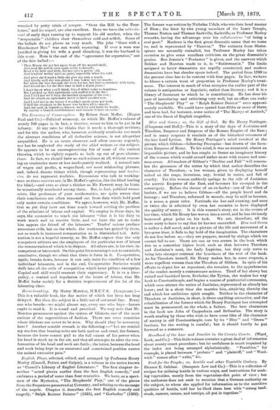Blue and Green ; or, the Gift of God. By
Sir Henry Pottinger. (Chapman and Hall.)—This is a story of the days of Justinian and Theodora, Emperor and Empress of the Roman Empire of the East ; and in many respects it reminds us of the historical romances of the late Lord Lytton. Sir Henry Pottinger's mind revolted at the picture which Gibbon—following Procopius—has drawn of the licen- tious Empress of Rome. To his mind, it was an unnatural, almost an impossible picture, and he has sought to frame an imaginary history of the woman which would accord rather more with reason and com- mon-sense. All readers of Gibbon's "Decline and Fall" will remem- ber the grossness of the terms by which that author describes the character of Theodora,—a low woman, given to displaying herself naked on the stage, licentious, nay, bestial in tastes, and full of cruelty. Yet this woman suddenly springs to the side of Justinian, the ascetic Emperor of the East, and becomes his co-equal in the sovereignty. Before the throne of an ex-harlot—one of the vilest of harlots, if we are to believe Gibbon—all the people kneel and do homage ; and Theodora, reformed in morals, may be said to become, in a sense, a great ruler. Fortitude she has and cunning, and once or twice she is admitted by even her enemies to have displayed the quality of mercy. It is this woman's story, set in the events of her time, which Sir Henry has woven into a novel, and he has obviously bestowed great pains on his task. We are, therefore, all the more sorry to have to say that he has not succeeded. Blue and Green is rather a dull novel, and as a picture of the life and movement of a bye-gone time, it fails to lay hold of the imagination. The characters do not live before us,—they are puppets, moved by strings which we cannot fail to see. There are one or two scenes in the book which rise to a somewhat higher level, such as that between Theodora and Justinian's aunt, the Lady Lupicina, but they only serve to bring into stronger contrast the heaviness of the rest of the book. As for Theodora herself, Sir Henry makes her, in some respects, a more repellent woman than the Theodora of Gibbon. In spite of his efforts to depict her as repentant, she remains, to the apprehension of the reader, merely a consummate actress. Tired of her showy but ruined and banished lover, Ecebolns; the Tyrian, she makes her way back to Constantinople, and begins a coarse of penitential ceremonies, which soon attract the notice of Justinian, represented as already her lover; and in a short time she marries him, attairing thereby the end which her ambitious spirit sought. Neither in the character of Theodora or Justinian, in short, is there anything attractive, and the rehabilitation of the former which Sir Henry Pottinger has attempted must be pronounced, on the whole, a failure. The best characters in the book are John of Cappadocia and Belisarius. The story is worth reading by those who wish to have some idea of the character of society in old Constantinople, torn by its "Blue" and "Green" factions, for the writing is careful ; but it should hardly be put forward as a romance.


































 Previous page
Previous page